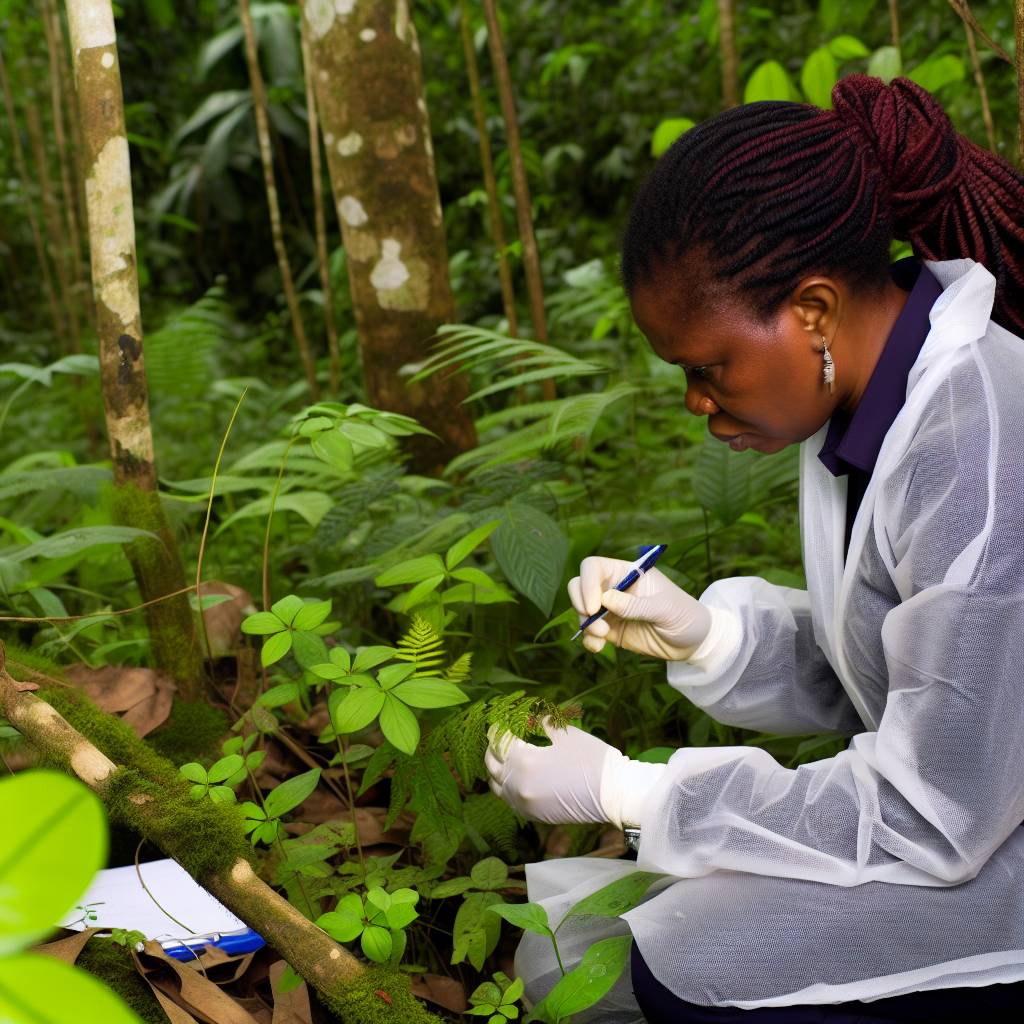Environmental biology programs play a crucial role in training professionals to address environmental challenges.
The field has seen a surge in demand for skilled individuals who can tackle issues related to conservation and sustainability.
Key courses offered in these programs are designed to provide students with a comprehensive understanding of ecological systems.
Core Courses
Core courses such as Ecology, Conservation Biology, and Environmental Policy give students a foundation in key principles.
These courses cover topics like biodiversity, ecosystem dynamics, and the impact of human activities on the environment.
Fieldwork and Research
Fieldwork and research-based courses are essential in allowing students to apply theoretical knowledge in real-world scenarios.
Field courses may include studying local ecosystems, conducting biodiversity surveys, or assessing the impact of pollution.
Specialized Courses
Specialized courses like Marine Biology, Land Management, or Climate Change offer students the opportunity to focus on specific areas.
These courses delve deeper into a particular aspect of environmental biology, allowing students to gain expertise in specialized fields.
Overall, the key courses in environmental biology programs are crucial in shaping the education and training of future environmental professionals.
Overview of Basic Concepts
Ecology, the study of the interactions between organisms and their environment, is a key component of environmental biology.
Biodiversity refers to the variety of life forms in a particular ecosystem and the importance of conserving this diversity.
Conservation involves efforts to protect and preserve the environment, species, and natural resources for future generations.
Sustainability focuses on creating a balance between human needs and the needs of the environment to ensure long-term environmental health.
Understanding these fundamental principles is vital for addressing pressing environmental issues that impact ecosystems, species populations, and overall environmental health.
Fieldwork and research methods are essential components of environmental biology programs.
These courses provide students with practical skills that are crucial for understanding and analyzing data in the field.
Practical Skills in Data Collection and Analysis
Students in environmental biology programs learn how to collect, handle, and analyze data effectively.
They are trained to use various tools and technologies for fieldwork, such as GPS devices, drones, and remote sensing equipment.
Fieldwork activities involve setting up experiments, collecting samples, and recording observations.
Students are taught how to use statistical tools and software to analyze data and draw meaningful conclusions from their research findings.
Importance of Hands-On Experience
Hands-on experience is crucial for students to gain a deeper understanding of ecosystems.
By engaging in fieldwork, they are able to observe natural processes firsthand and develop a more intimate knowledge of the environment.
Fieldwork allows students to apply theoretical concepts learned in the classroom to real-world situations.
It enhances their problem-solving skills, critical thinking abilities, and decision-making capabilities when faced with complex environmental issues.
Role of Fieldwork in Environmental Research and Conservation
Fieldwork plays a significant role in environmental research and conservation efforts.
It provides researchers with valuable data that can help assess the health of ecosystems, monitor biodiversity, and identify environmental threats.
Through fieldwork, scientists can study the impact of human activities on natural habitats and ecosystems.
This information is essential for developing conservation strategies and policies aimed at protecting and restoring the environment.
Fieldwork and research methods are integral components of environmental biology programs.
They equip students with the skills and knowledge needed to address environmental challenges and contribute to the conservation of our planet’s biodiversity.
See Related Content: Environmental Biology: Fieldwork vs. Lab Work
Environmental Chemistry and Pollution
Environmental chemistry is a vital course in environmental biology programs.
This course focuses on the study of chemical processes in the environment.
- Study of chemical processes in the environment:
- Exploration of pollutants and their impact on ecosystems:
- Strategies for monitoring and mitigating pollution in different environments:
Students will learn about the chemical composition of the atmosphere, water, and soil.
They will explore the interactions between different chemical compounds in the environment.
Students will also learn how these interactions impact living organisms.
This course will delve into the various types of pollutants released into the environment.
Students will study the effects of pollutants on ecosystems.
They will learn how pollutants disrupt natural processes and harm biodiversity.
Transform Your Career with Expert Guidance
Get personalized mentorship consulting that’s tailored to your unique path. Our expert advice is actionable and exclusive.
Get StartedStudents will be introduced to methods for monitoring pollution levels.
This includes air quality monitoring and water quality testing.
They will also learn strategies for reducing pollution.
Students will implement sustainable practices to protect the environment.
Environmental chemistry and pollution courses provide students with knowledge and skills.
These skills help them understand the impact of chemical processes on the environment.
Students will develop solutions to mitigate pollution effectively.
You Might Also Like: Importance of Environmental Education in Nigeria
Conservation Biology is a critical component of Environmental Biology programs.
It focuses on the preservation of biodiversity and natural resources.
Importance of Conservation Biology
Conservation Biology plays a vital role in identifying and implementing strategies to protect endangered species.
It aims to preserve habitats and restore ecosystems.
Key Topics Covered
- Endangered species: Conservation Biology explores the reasons behind species endangerment.
- Habitat loss: Understanding the causes of habitat destruction is crucial.
- Ecosystem restoration: Conservation Biology discusses techniques for restoring degraded ecosystems.
Case Studies
Environmental Biology programs often include case studies that highlight successful conservation efforts around the world.
These case studies provide real-world examples of effective conservation strategies.
They inspire students to participate in similar initiatives.
By studying Conservation Biology, students gain a comprehensive understanding of the challenges facing biodiversity.
They also develop the knowledge and skills necessary to contribute to conservation efforts.
This education enables them to make a positive impact on the environment.
You Might Also Like: Nigeria’s Environmental Laws and Regulations

Climate Change and Adaptation:
Climate change is a pressing issue that environmental biology programs cannot ignore.
In this course, students delve into the science behind climate change, examining the causes and effects of global warming.
They learn about the role of greenhouse gases, deforestation, and industrial activities in contributing to climate change.
One key aspect of this course is exploring strategies for adaptation and mitigation in response to global warming.
Students study various adaptation measures such as building resilience in ecosystems, developing sustainable practices, and implementing policies to reduce greenhouse gas emissions.
Understanding the impact of climate change on biodiversity and ecosystems is crucial for effective conservation efforts.
Students learn how rising temperatures, changing weather patterns, and sea level rise affect different species and habitats.
They also examine case studies of how climate change has already impacted natural ecosystems around the world.
Furthermore, students explore the importance of collaborative approaches in addressing climate change.
They learn about international agreements like the Paris Agreement and the role of governments, organizations, and individuals in tackling this global challenge.
By studying climate change and adaptation, students gain valuable insights into how to make a positive impact on the environment.
You Might Also Like: Careers in Aquaculture in Nigeria
Environmental Policy and Law:
- Overview of regulations and policies governing environmental protection
- Discussion on the role of government and international agreements in conservation efforts
- Importance of interdisciplinary approaches in addressing complex environmental challenges
Environmental policy and law play a crucial role in shaping the way we interact with our environment.
These regulations are designed to protect ecosystems, wildlife, and human health from harmful practices.
In environmental biology programs, students delve into the intricacies of these policies to understand their impact on conservation efforts.
One key aspect of studying environmental policy and law is gaining an overview of the regulations that govern environmental protection.
This includes learning about laws at local, national, and international levels that aim to safeguard natural resources and promote sustainable practices.
By understanding these regulations, students can identify areas where policy changes may be needed to address pressing environmental issues.
Additionally, students explore the role of government in environmental conservation, as well as the importance of international agreements in shaping global efforts to protect the planet.
Governments play a vital role in creating and enforcing environmental policies, while international agreements facilitate cooperation between countries to tackle transnational environmental challenges.
Through case studies and discussions, students analyze the impact of these policy frameworks on conservation efforts worldwide.
Another crucial aspect of studying environmental policy and law is recognizing the need for interdisciplinary approaches to address complex environmental challenges.
These challenges often require collaboration between scientists, policymakers, stakeholders, and communities to develop effective solutions.
By learning how to work across disciplines, students can contribute to innovative conservation strategies that consider social, economic, and environmental factors.
Environmental policy and law are integral components of environmental biology programs.
By gaining a comprehensive understanding of regulations, government roles, and interdisciplinary approaches, students are equipped to make informed decisions and contribute to the preservation of our planet.
Environmental biology programs offer students a diverse range of key courses.
Through these courses, students gain knowledge and skills necessary for understanding and addressing environmental issues.
Key courses cover topics such as ecology, conservation, biodiversity, and environmental policy.
Students learn to analyze and solve complex environmental problems through these courses.
Importance of Key Courses
Environmental biology programs emphasize interdisciplinary education to prepare students for careers in environmental science.
Integration of biology, chemistry, physics, and social sciences provides a holistic approach.
Students develop critical thinking and problem-solving skills needed in the field.
Interdisciplinary Education
Individuals interested in pursuing studies in this field are encouraged to explore key courses.
These courses offer a comprehensive understanding of environmental issues and solutions.
Through interdisciplinary education and key courses, students become well-equipped to make a positive impact in the field of environmental biology.




